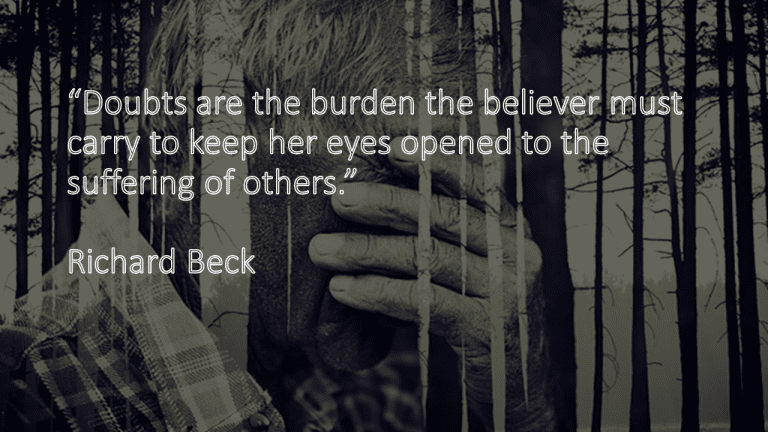I am quite happy to say that it occurred to me recently that Jesus’ criticism of the Pharisees – that they tie burdens on the backs of those who learn and follow their teachings – might apply to me. One of the things I love about the discussions in my Sunday school class at Crooked Creek Baptist Church is that I have a range of people with different backgrounds and interests, including four ordained ministers in various degrees of retirement. They consistently ask about the relevance of matters that I raise simply because they happen to be possibilities or side issues connected with the text that we are looking at. And as we discussed an issue of textual criticism in relation to John 7-8, one of them asked what it might be appropriate to say to someone who becomes aware of the issue but isn’t able/willing/prepared to shoulder the burden that this information places on them.
On the one hand, I think that information about divergent manuscripts of texts included in the Bible only seems burdensome because people have been previously misinformed about what the Bible is. On the other hand, this very aspect of the matter is what makes it relevant: the Bible itself is more complex than those who pretend that “the Bible says it, that settles it” are willing to admit. It is important that such fundamentalist oversimplification be challenged, and challenged by the Bible itself!
Moreover, as a follower of Jesus and fan of Dostoyevsky, I am inclined to believe that Jesus himself burdened his students in precisely this way. He did say that his burden is light, but that may depend on one’s perspective. In his famous parable of the Grand Inquisitor in The Brothers Karamazov, the head of the Church is depicted as accusing Jesus of having burdened people with a freedom they did not really want and could not handle – and so people turned to the church, to take that burdensome freedom away from them and instead tell them what to believe and do. If we are persuaded that freedom is indeed the light burden, the easy yoke, that Jesus placed upon us, then it is precisely this burden that fundamentalists seek to avoid by choosing what seems like an easier yoke – deferring to some other authority, whether the Bible (as understood in this or that particular way) or the church. But that burden is much harder to bear, since the effort required to shore up a fundamentalist worldview against counter-evidence is exhausting.
And so in light of this, I don’t think that the burden that I place on students is the one Jesus was criticizing, but hopefully is the same one that he himself calls us to take up. I can thus affirm what Sheila Kennedy wrote recently in a blog post that is worth reading in its entirety:
Blaming the propagandists and conspiracy theorists lets their audiences off the hook–it assumes a lack of moral agency. The people who parrot “Fox and Friends” choose their news, and they choose not to balance it with other perspectives. For whatever reason–impelled by whatever inadequacies and resentments–they choose to indulge in confirmation bias rather than resisting it.
Jesus did not criticize the Pharisees for placing the burden of moral agency on their followers. But he did accuse them of complicating the simple and oversimplifying the complex, and that is a real risk that I must continue to struggle to avoid – as must we all.
Also relevant to this topic is the passage in Galatians where Paul talks about bearing one another’s burdens. I also think that the Zen Pencils comic strip “Just Keep Missing” is relevant. As an educator and lifelong learner, I know that the only way we succeed at anything is via a route that involves failure. If you’re not failing at anything, you’re not doing anything that is stretching your abilities in a way that will lead to growth and improvement. And so I encourage you all to have the courage to set yourselves up for failure – and to persevere!
https://zenpencils.com/comic/missing/
Don’t miss as well another bit of news about textual criticism: the so-called first century fragment of the Gospel of Mark is due to be published, it would seem, with its probable date now being given as second to third century. And finally, I will share again a meme that I made recently from a quote from Richard Beck:














